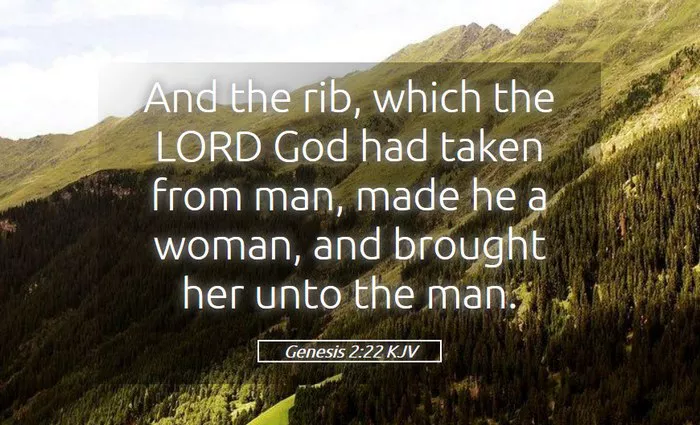Read the Daily Bible Verse Genesis 2:22 To Strengthen Your Spiritual Journey.
The book of Genesis, the first book of the Bible, holds a pivotal place in Christian theology and human history. It offers foundational narratives about the creation of the world, the fall of humanity, and the origins of various human institutions and practices. Genesis 2:22 is a key verse within the creation narrative, specifically addressing the formation of the first woman, Eve. This passage has profound implications for understanding human relationships, the nature of companionship, and the divine intention behind marriage. In this article, we will explore Genesis 2:22 in depth, examining its context, meaning, application in life, comparisons with other biblical texts, modern-day relevance, and scholarly commentary.
The Context on Genesis 2:22 KJV
Genesis 2:22 states:
“And the rib, which the Lord God had taken from man, made he a woman, and brought her unto the man.” (KJV)
This verse appears within the broader context of Genesis chapters 1 and 2, which provide two accounts of creation. Genesis 1 offers a sweeping overview of the creation of the universe and all living things, culminating in the creation of humanity in God’s image. Genesis 2 provides a more detailed account of the creation of man and woman, focusing on the intimate and relational aspects of their origin.
In Genesis 2, God forms Adam from the dust of the ground and places him in the Garden of Eden to tend and keep it. However, God observes that it is not good for Adam to be alone, leading to the creation of a suitable helper. After Adam names all the animals, but finds no suitable companion, God causes a deep sleep to fall upon him, and from one of Adam’s ribs, God creates Eve.
The Genesis 2:22 Meaning
The verse “And the rib, which the Lord God had taken from man, made he a woman, and brought her unto the man” carries significant theological and relational implications. It emphasizes the divine origin of the woman, indicating that she is not a separate creation but is intricately connected to the man. The use of the rib signifies the closeness and equality between man and woman, suggesting that they are meant to stand side by side as partners.
Furthermore, the act of God bringing the woman to the man illustrates the intentional design of God in establishing the first human relationship. This action highlights the complementary nature of men and women, designed to support and complete one another. The narrative underscores the importance of companionship and the divine blessing upon the institution of marriage.
See Also: Genesis 8:22 Meaning, Context & Commentary
Genesis 2:22 Application in Life
The principles derived from Genesis 2:22 have wide-ranging applications in life, particularly in understanding the nature of relationships and marriage. This passage serves as a reminder that relationships are part of God’s design for human flourishing. It emphasizes the importance of companionship, mutual support, and the need for meaningful connections in our lives.
In the context of marriage, Genesis 2:22 provides a blueprint for the union between husband and wife. It calls for a relationship based on equality, respect, and love, where both partners support and complement each other. The passage also highlights the significance of divine guidance in the formation and nurturing of marital relationships.
Comparison with Other Biblical Texts
Genesis 2:22 can be compared with other biblical texts that address the creation of humanity and the nature of relationships. For instance, Genesis 1:27 states, “So God created man in his own image, in the image of God created he him; male and female created he them.” This verse emphasizes the equal dignity and worth of both men and women, created in the image of God.
In the New Testament, Ephesians 5:22-33 offers a reflection on the marital relationship, drawing parallels between the relationship of Christ and the church and the relationship between husband and wife. This passage reinforces the idea of mutual love, respect, and self-giving within the marriage covenant, echoing the themes found in Genesis 2:22.
Modern-Day Relevance
In today’s world, where relationships and the institution of marriage are often under strain, the message of Genesis 2:22 remains profoundly relevant. The passage calls for a return to the principles of mutual respect, equality, and companionship that are foundational to healthy relationships. It challenges societal norms that undermine the sanctity of marriage and encourages individuals to seek divine guidance in their relationships.
Moreover, the verse speaks to the broader human need for connection and community. In an age marked by individualism and isolation, Genesis 2:22 reminds us of the importance of nurturing meaningful relationships and the role of community in fostering human well-being.
Conclusion
Genesis 2:22 is a rich and profound verse that offers valuable insights into the nature of human relationships and the divine intention behind them. It underscores the importance of companionship, equality, and mutual support, providing a blueprint for healthy and fulfilling relationships. As we navigate the complexities of modern life, the message of Genesis 2:22 serves as a guiding light, reminding us of the enduring principles that underpin human flourishing.
Genesis 2:22 Commentary
Scholars and theologians have long reflected on the significance of Genesis 2:22, offering various interpretations and insights. Many emphasize the verse’s portrayal of the intimate and equal partnership between man and woman, which counters any notion of male superiority. The use of the rib is seen as symbolic of closeness and equality, signifying that man and woman are meant to walk side by side.
Some commentators also highlight the theological implications of God’s role in the creation of the woman. This act of divine intervention underscores the sacredness of human relationships and the importance of seeking God’s guidance in forming and nurturing these bonds.
Overall, Genesis 2:22 continues to inspire and challenge believers to embrace the divine principles of love, respect, and companionship in their relationships, reflecting the beauty and harmony of God’s original design.


